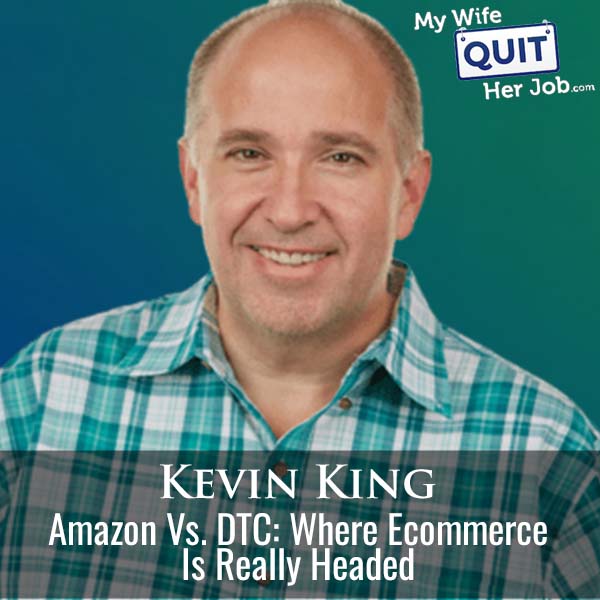606: Kevin King On The Future Of Ecommerce: Amazon vs DTC In 2025

```html E-commerce Landscape in 2025: Amazon vs. Direct-to-Consumer - An Expert Analysis
The e-commerce landscape is rapidly evolving, prompting businesses to strategically navigate the shifting dynamics between established platforms like Amazon and the burgeoning direct-to-consumer (DTC) model. In a recent discussion on the "My Wife Quit Her Job Podcast," veteran Amazon entrepreneur Kevin King provided insights into the future of online retail, highlighting key trends and challenges for sellers in 2025 and beyond.
The Changing Face of E-commerce
King, known for his Freedom Ticket course and Billion Dollar Sellers Summit, emphasized that the "Amazon gold rush" is over. The ease with which individuals could launch products and generate substantial profits a decade ago has diminished, replaced by a more complex and competitive environment. He stresses that success now requires a comprehensive understanding of various business aspects, including logistics, sourcing, inventory management, finance, marketing, and customer service.
Expert Perspective: The Rise of Specialization
"The days of the generalist seller are numbered," argues e-commerce analyst Sarah Chen. "The increasing complexity of the market demands specialization. Sellers need to either focus on a niche product category, excel in a specific operational area like supply chain optimization, or leverage advanced technologies like AI to gain a competitive edge."
Amazon in 2025: Still Worth It?
King suggests that while Amazon remains a valuable platform for launching and validating products due to its massive user base, it should not be the sole focus of an e-commerce business. He points to rising Amazon fees and compressed margins as factors that necessitate diversification and a strategic approach to online selling.
He further explained that while the barriers to entry might seem low, sustainably growing an Amazon business requires significant capital and a willingness to reinvest profits. He advises prospective sellers to carefully calculate their initial landing costs and ensure they have sufficient capital to cover subsequent inventory purchases and marketing expenses.
The Future of DTC
The conversation also touched upon the future of DTC brands. While Amazon offers immediate access to a large customer base, DTC allows for greater control over branding, customer relationships, and data. King suggests that a hybrid approach, leveraging both Amazon and a DTC channel, may be the most effective strategy for many businesses.
The Impact of AI on E-commerce
King also touched on the growing impact of Artificial Intelligence (AI) on the e-commerce industry. He believes that AI will automate many tasks that are currently handled by humans, such as product research, listing optimization, and customer service. This will lead to increased efficiency and lower costs for businesses that are able to effectively leverage AI technologies.
Historical Context: Amazon's Evolution
Amazon's journey from an online bookstore to a global e-commerce giant has fundamentally reshaped the retail landscape. Founded in 1994 by Jeff Bezos, the company initially focused on providing a vast selection of books at competitive prices. Over the years, Amazon expanded its product offerings to include virtually every category imaginable, transforming into a one-stop shop for consumers worldwide.
The introduction of Fulfillment by Amazon (FBA) in 2006 was a pivotal moment, enabling third-party sellers to leverage Amazon's logistics infrastructure and reach a wider audience. This fueled the growth of the Amazon marketplace, attracting millions of sellers and further solidifying Amazon's dominance in e-commerce.
Expert Perspective: The Importance of Brand Building
Marketing professor, Dr. Emily Carter, emphasizes the enduring importance of brand building. "In a crowded online marketplace, a strong brand is essential for differentiation. DTC brands have the advantage of building direct relationships with customers and crafting a unique brand identity that resonates with their target audience. This is becoming increasingly important as consumers seek authenticity and personalized experiences."
Key Takeaways for E-commerce Businesses
The "Amazon gold rush" is over, and success now requires a sophisticated understanding of e-commerce. Amazon remains a valuable platform for launching products, but should not be the sole focus. DTC offers greater control over branding and customer relationships, but requires investment in marketing and infrastructure. AI will play an increasingly important role in e-commerce, automating tasks and improving efficiency. Building a strong brand is essential for differentiation and long-term success.
E-commerce businesses must adapt to the evolving landscape by embracing specialization, diversifying their sales channels, and leveraging new technologies. By focusing on building strong brands and providing exceptional customer experiences, businesses can thrive in the competitive world of online retail. ```
Originally sourced from: WifeQuitHer Job
